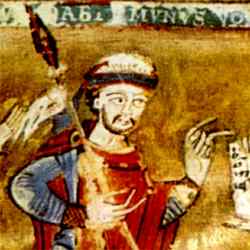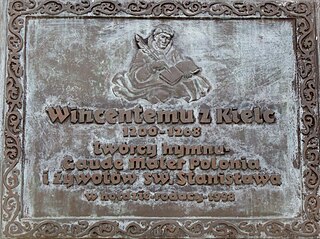Related Research Articles

Ottokar I was Duke of Bohemia periodically beginning in 1192, then acquired the title King of Bohemia, first in 1198 from Philip of Swabia, later in 1203 from Otto IV of Brunswick and in 1212 from Frederick II. He was a member of the Přemyslid dynasty.
Taksony was the Grand Prince of the Hungarians after their catastrophic defeat in the 955 Battle of Lechfeld. In his youth he had participated in plundering raids in Western Europe, but during his reign the Hungarians only targeted the Byzantine Empire. The Gesta Hungarorum recounts that significant Muslim and Pecheneg groups settled in Hungary under Taksony.
Vladislaus I was Duke of Bohemia from 1109 to 1117 and from 1120 until his death.

Spytihněv II, a member of the Přemyslid dynasty, was Duke of Bohemia from 1055 until his death.
Mstislav II Izyaslavich was the prince of Pereiaslav and Volodymyr and the grand prince of Kiev.

Kouřim is a town in Kolín District in the Central Bohemian Region of the Czech Republic. It has about 1,900 inhabitants. It is located 45 km (28 mi) east of Prague. The town centre is well preserved and is protected by law as an urban monument zone.

The Principality of Hungary or Duchy of Hungary was the earliest documented Hungarian state in the Carpathian Basin, established 895 or 896, following the 9th century Hungarian conquest of the Carpathian Basin.

Wincenty of Kielcza was a Polish canon, poet, and composer, working in Kraków and writing in Latin. He was a member of the Dominican Order.
The Gladstone Prize is an annual prize awarded by the Royal Historical Society to debut authors for a history book published in Britain on any topic which is not primarily British history. The prize is named in honour of William Ewart Gladstone and was made possible by a grant by the Gladstone Memorial Trust. It was first awarded in 1998, the centenary of Gladstone's death.
Eastern Orthodoxy in Hungary refers to communities, institutions and organizations of the Eastern Orthodox Christianity in Hungary. Historically, Eastern Orthodoxy was an important denomination in the medieval and early modern Kingdom of Hungary. In modern times, Eastern Orthodoxy is mainly the religion of some ethnic minorities. In the 2001 national census, only 15,928 persons declared themselves Orthodox Christians.

Anonymus Bele regis notarius or Master P. was the notary and chronicler of a Hungarian king, probably Béla III. Little is known about him, but his latinized name began with P, as he referred to himself as "P. dictus magister".
The ten-lanced nobles, also Szepes lancers,Spiš lancers, or lance-bearers of Szepes were group of conditional noblemen living in the Szepes region of the Kingdom of Hungary. These nobles were previously part of the contingent assigned with border guard duties in the periphery of the conquered territories in the region. In the thirteenth century, some of these groups were officially integrated into the Hungarian nobility. They received their privileges from King Béla IV of Hungary in 1243. They were obliged to equip ten knights or lancers. They were not subject to the authority of the ispán of Szepes County and tax was collected from them only if the "royal servants" were also required to pay it. Initially, they formed about 40 families, but their number decreased to less than 20 families by the 16th century. They lost their special status in 1804.

Pilis Abbey was a Cistercian monastery in the Pilis Hills in the Kingdom of Hungary. It was founded in 1184 by monks who came from Acey Abbey in France at the invitation of Béla III of Hungary. It was dedicated to the Virgin Mary.
The udvornici, also udvarniks or royal serving people, was a class of half-free people who were obliged to provide well-specified services to the royal court in the medieval Kingdom of Hungary. They seem to have been descended from the Slavic population which was subjugated during the Hungarian conquest of the Carpathian Basin. Word udvornici is derived from slavic "U dvora", meaning "at/near the (royal) court". Their lord was the monarch, but they were administered by the Palatine.
The history of Christianity in Poland started in the reign of Mieszko I of Poland who was baptised in 966.
Paulus Hungarus was a Hungarian friar of the Dominican Order who lived during the thirteenth century, and is author of the Summa poenitentiae, Hungarus also annotated Compilatio I-III, a collection of Canon law. Hungarus planned a network of monasteries throughout the Kingdom of Hungary to act as a bulwark against heresy, one of which is the Biserica Mănăstirii Dominicane in Sighişoara.

The coinage in the Kingdom of Hungary started during the reign of Stephen I who was crowned the first king of Hungary in 1000 or 1001.
The title of Duke of Olomouc or Prince of Olomouc was held by members of the Bohemian Přemyslid dynasty in the Middle Ages in Moravia. Olomouc was a gord in Moravia.
The freemen's pennies or the pennies of freemen was a direct tax in the Kingdom of Hungary in the 11th-13th centuries.
The Metropolitanate of Tourkia was an Eastern Orthodox diocese (eparchy) in the Medieval Hungary, during the 11th and 12th centuries. Its name was derived from the term Tourkia (Turkey), used by the Byzantine Empire as a designation for the Hungarian medieval state. Since the Metropolitanate of Tourkia was created under the auspices of the Patriarchate of Constantinople, the common Byzantine term for the country was also applied to the newly created eparchy. According to some modern scholars, the Metropolitanate of Tourkia had jurisdiction over Eastern Orthodox ecclesiastic system throughout the Kingdom of Hungary.
References
- ↑ "Dr Nora Berend". St Catharine's College, Cambridge. Retrieved 2016-11-28.
- ↑ "Gladstone Prize". Royal Historical Society . Retrieved 2016-11-28.
- ↑ Berend, Nora (2017-05-15). The Expansion of Central Europe in the Middle Ages. Routledge. ISBN 978-1-351-89008-3.